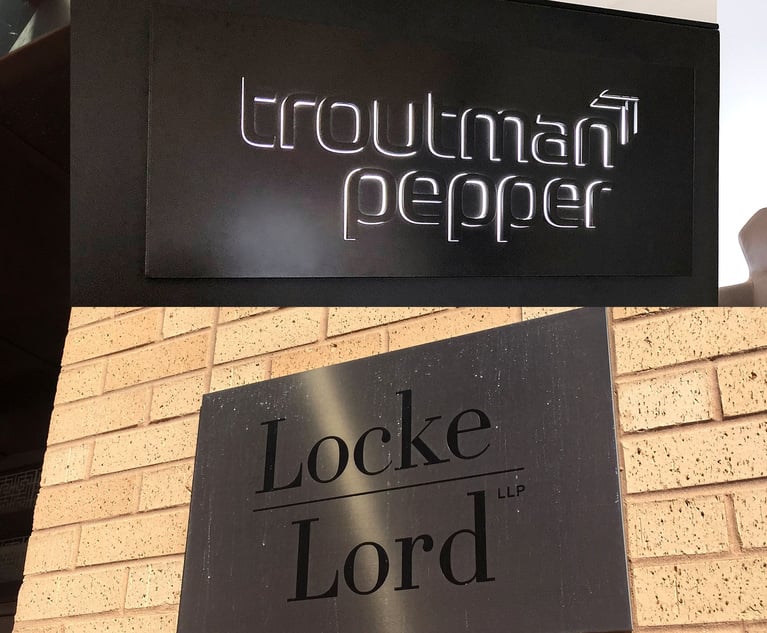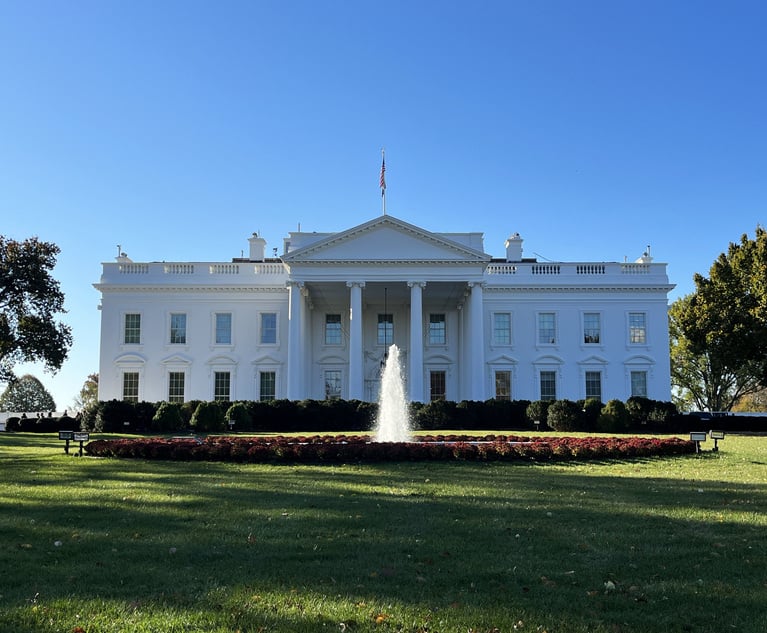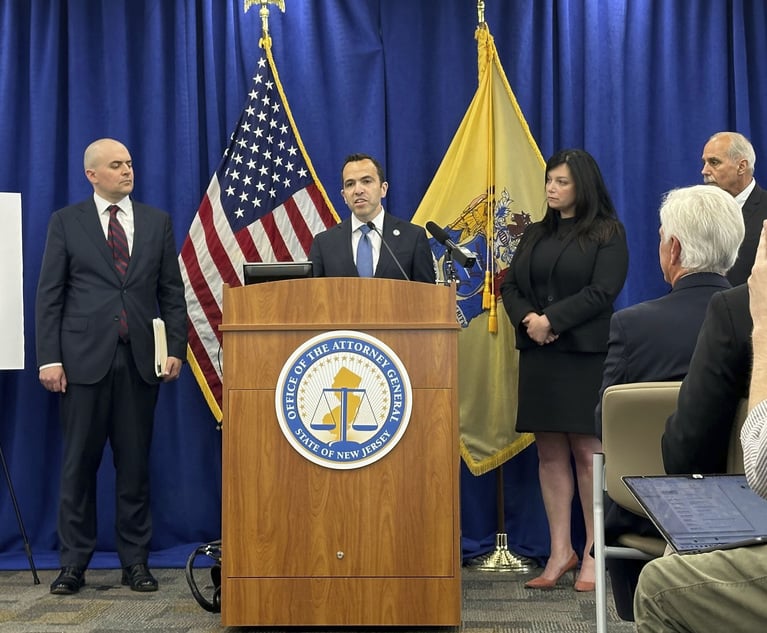State Argues to Pa. Justices That Consumer Protection Law Covers Landowners in Gas Leases
Do natural gas lease agreements entered into by drillers and private landowners fall under the state Unfair Trade Practices and Consumer Protection Law's definition of "trade or commerce"? That was the question before the Pennsylvania Supreme Court on May 27, the third day of livestreamed oral arguments.
May 28, 2020 at 04:17 PM
6 minute read
 Photo credit: junrong / Shutterstock.com
Photo credit: junrong / Shutterstock.com
Do natural gas lease agreements entered into by drillers and private landowners fall under the state Unfair Trade Practices and Consumer Protection Law's definition of "trade or commerce"?
That was the question before the Pennsylvania Supreme Court on May 27, the third day of livestreamed oral arguments.
In Anadarko Petroleum v. Commonwealth, the Commonwealth Court en banc ruled 6-1 in a March 15, 2019, precedential opinion that the state Office of Attorney General can bring UTPCPL claims against drillers for alleged conduct related to subsurface mineral rights leases.
The majority also ruled that the office can bring a cause of action against lessees, under the UTPCPL, for alleged violations of antitrust law. However, the court said that in this specific case, only one of the two antitrust claims advanced by prosecutors was legally viable.
On Oct. 30, 2019, the Supreme Court granted allocatur in the case, agreeing to consider two issues: "(1) Are claims by the commonwealth, brought on behalf of private landowners against natural gas extractors alleging that the extractors used deceptive, misleading, and unfair tactics in securing natural gas leases from landowners, cognizable under the Unfair Trade Practices and Consumer Protection Law? (2) May the commonwealth pursue antitrust remedies under the Unfair Trade Practices and Consumer Protection Law?"
State Attorney General Josh Shapiro filed suit in the Bradford County Court of Common Pleas against Anadarko Petroleum Corp., Anadarko E&P Onshore, Chesapeake Energy Corp., Chesapeake Appalachia, Chesapeake Operating and Chesapeake Energy Marketing, alleging the defendants violated both the UTPCPL and Pennsylvania antitrust common law by using deceptive, misleading and unfair tactics, and committed antitrust violations, in their lease dealings with private landowners.
Shapiro's office alleged that Anadarko and Chesapeake agreed to split between them the portion of the Marcellus Shale formation that lies beneath northeast Pennsylvania, giving them exclusive areas in which they could seek leases without having to compete with each other.
Much of the May 27 argument centered on Section 2(3) of the UTPCPL, which states, "''Trade' and 'commerce' mean the advertising, offering for sale, sale or distribution of any services and any property, tangible or intangible, real, personal or mixed, and any other article, commodity, or thing of value wherever situate, and includes any trade or commerce directly or indirectly affecting the people of this commonwealth."
Anadarko's attorney, Stephen Cozen of Cozen O'Connor in Philadelphia, called the state's position an "overreach" based on the "faulty reasoning" that the CPL applies to any and all commercial transactions.
In the context of natural gas leases, Cozen argued, the landowner is the seller and the extraction company is the buyer.
"Since its enactment in 1968, no Pennsylvania court until now has ever interpreted the CPL as authorizing a claim by or on behalf of a seller against a person who acquires something from a seller or as separately authorizing a right of action against person simply because that person is involved in any form of commercial transaction," Cozen said.
Justice Christine Donohue asked Cozen why the UTPCPL should not apply to gas leases when the "economic reality" is that "gas extractors are actually selling their services as gas extractors to individuals who are looking for the ability to have their gas extracted."
Cozen said the statutory construction of the UTPCPL does not support that type of analysis.
In addition, he argued, the structure of a natural gas lease is such that the landowner is the seller and is compensated by the driller through up-front payments and royalty payments.
"If you follow your question to the logical extreme then what you have is you're telling me if I'm involved in a business transaction where my client is selling its business to Mr. B and Mr. B wants to pay considerations of cash and a share of future profits, that Mr. B is actually selling future profits to my client and the AG can interfere with our private party transaction in the sale of a business," Cozen said. "I think that's absurd, quite frankly, and I see absolutely no support for that either in the statutory language itself or in the legislative history."
Justice Max Baer similarly asked Chesapeake's attorney, Daniel Brier of Myers Brier and Kelly in Scranton, why the UTPCPL wouldn't protect landowners in lease transactions since they're typically "the preyed-upon party."
But Brier said the idea that there is a major power imbalance in every gas lease is a "narrative" that is not based in reality.
In fact, Brier said, many landowners are actually significant corporate entities or groups of landowners that have pooled their resources and hired attorneys to represent them in the lease negotiations.
Brier said the legislature could have written the UTPCPL differently if it simply wanted to protect the party in each transaction with less bargaining power. Instead, however, the UTPCPL is specifically worded to protect buyers, not sellers, he added.
Brier also noted that landowners who feel they've been wronged in some way by a lessee are not without recourse, as they can—and have—sued for breach of contract.
Senior Deputy Attorney General Howard Hopkirk, arguing for the state, said there is "no real doubt that securing leases for production of natural gas is a business activity which constitutes trade and commerce."
Hopkirk said the assertion that the UTPCPL applies only to sellers of goods and services is "simply not true."
"Sections 7 and 9.2 provide for private actions against sellers," he said. "They do not impose general limitations on the definition of 'trade and commerce' or other parts of the law."
Hopkirk said the state's action in this case was brought under Section 4 of the law, which gives the attorney general the power to file suit if they "'[have] reason to believe that any person is using or is about to use any method, act or practice declared by [73 P.S. Section 201-3] to be unlawful, and that proceedings would be in the public interest.'
"Actions under Section 4 are not limited to sellers and may be brought against any person engaged in unfair and deceptive trade practices," Hopkirk said.
This content has been archived. It is available through our partners, LexisNexis® and Bloomberg Law.
To view this content, please continue to their sites.
Not a Lexis Subscriber?
Subscribe Now
Not a Bloomberg Law Subscriber?
Subscribe Now
NOT FOR REPRINT
© 2025 ALM Global, LLC, All Rights Reserved. Request academic re-use from www.copyright.com. All other uses, submit a request to [email protected]. For more information visit Asset & Logo Licensing.
You Might Like
View All
'Close Our Borders?' Senate Judiciary Committee Examines Economics, Legal Predicate for Mass Deportation Proposal
3 minute read


Parker McCay Leader, Brown & Connery Partner Face Racketeering Indictments Alongside George Norcross
5 minute readLaw Firms Mentioned
Trending Stories
- 1New York-Based Skadden Team Joins White & Case Group in Mexico City for Citigroup Demerger
- 2No Two Wildfires Alike: Lawyers Take Different Legal Strategies in California
- 3Poop-Themed Dog Toy OK as Parody, but Still Tarnished Jack Daniel’s Brand, Court Says
- 4Meet the New President of NY's Association of Trial Court Jurists
- 5Lawyers' Phones Are Ringing: What Should Employers Do If ICE Raids Their Business?
Who Got The Work
J. Brugh Lower of Gibbons has entered an appearance for industrial equipment supplier Devco Corporation in a pending trademark infringement lawsuit. The suit, accusing the defendant of selling knock-off Graco products, was filed Dec. 18 in New Jersey District Court by Rivkin Radler on behalf of Graco Inc. and Graco Minnesota. The case, assigned to U.S. District Judge Zahid N. Quraishi, is 3:24-cv-11294, Graco Inc. et al v. Devco Corporation.
Who Got The Work
Rebecca Maller-Stein and Kent A. Yalowitz of Arnold & Porter Kaye Scholer have entered their appearances for Hanaco Venture Capital and its executives, Lior Prosor and David Frankel, in a pending securities lawsuit. The action, filed on Dec. 24 in New York Southern District Court by Zell, Aron & Co. on behalf of Goldeneye Advisors, accuses the defendants of negligently and fraudulently managing the plaintiff's $1 million investment. The case, assigned to U.S. District Judge Vernon S. Broderick, is 1:24-cv-09918, Goldeneye Advisors, LLC v. Hanaco Venture Capital, Ltd. et al.
Who Got The Work
Attorneys from A&O Shearman has stepped in as defense counsel for Toronto-Dominion Bank and other defendants in a pending securities class action. The suit, filed Dec. 11 in New York Southern District Court by Bleichmar Fonti & Auld, accuses the defendants of concealing the bank's 'pervasive' deficiencies in regards to its compliance with the Bank Secrecy Act and the quality of its anti-money laundering controls. The case, assigned to U.S. District Judge Arun Subramanian, is 1:24-cv-09445, Gonzalez v. The Toronto-Dominion Bank et al.
Who Got The Work
Crown Castle International, a Pennsylvania company providing shared communications infrastructure, has turned to Luke D. Wolf of Gordon Rees Scully Mansukhani to fend off a pending breach-of-contract lawsuit. The court action, filed Nov. 25 in Michigan Eastern District Court by Hooper Hathaway PC on behalf of The Town Residences LLC, accuses Crown Castle of failing to transfer approximately $30,000 in utility payments from T-Mobile in breach of a roof-top lease and assignment agreement. The case, assigned to U.S. District Judge Susan K. Declercq, is 2:24-cv-13131, The Town Residences LLC v. T-Mobile US, Inc. et al.
Who Got The Work
Wilfred P. Coronato and Daniel M. Schwartz of McCarter & English have stepped in as defense counsel to Electrolux Home Products Inc. in a pending product liability lawsuit. The court action, filed Nov. 26 in New York Eastern District Court by Poulos Lopiccolo PC and Nagel Rice LLP on behalf of David Stern, alleges that the defendant's refrigerators’ drawers and shelving repeatedly break and fall apart within months after purchase. The case, assigned to U.S. District Judge Joan M. Azrack, is 2:24-cv-08204, Stern v. Electrolux Home Products, Inc.
Featured Firms
Law Offices of Gary Martin Hays & Associates, P.C.
(470) 294-1674
Law Offices of Mark E. Salomone
(857) 444-6468
Smith & Hassler
(713) 739-1250





